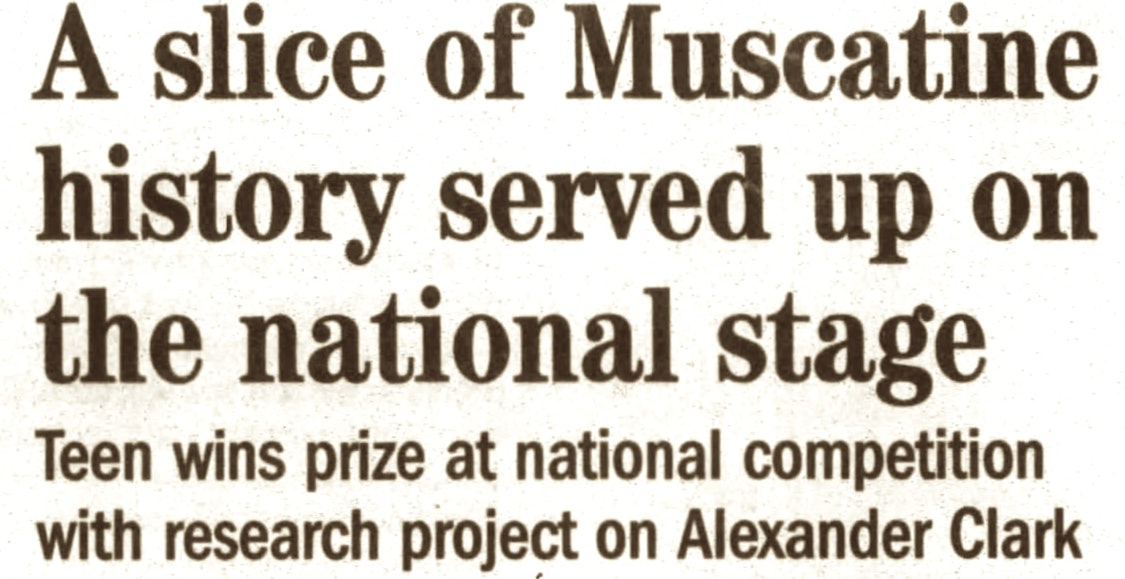
This column by Daniel G. Clark about Alexander Clark (1826-1891) first appeared in the Muscatine Journal on November 29, 2023.
This month I assisted a northeast Iowa middle-school student with her National History Day project.
“I am doing Alexander Clark and the impacts he had on desegregating schools,” she explained.
We traded messages and then “zoomed” with help from her teacher. I asked if she knew that a student’s Alexander Clark essay had won big at the national level. Then it struck me how long ago it happened.
“That was before you were born, so it’s time for another winner!”
Muscatine Journal headline, June 19, 2006: “A slice of Muscatine history served up on the national stage / Teen wins prize at national competition with research project on Alexander Clark.”
Editor Jeff Tecklenburg wrote: “Stephen Frese of Marshalltown won the grand prize at the weeklong National History Day competition that wound up June 15. Frese won a four-year, full-tuition scholarship to Case Western Reserve University in Cleveland, Ohio, valued at more than $100,000.”
“Frese also took home his fifth medal for Iowa, placing first in the historical paper category after winning other honors in previous years.”
Earlier, after his state-level win in May (named Outstanding Young Historian for a $2,000 scholarship), reporter Melissa Regennitter had introduced the eleventh-grader to Journal readers.
Frese said he chose Clark for his research paper because he read about his fight for desegregation. … Frese did most of his research the old-fashioned way, traveling from place to place to find information that would lead him to more sources. … Earlier this spring, he traveled to Muscatine and talked with Kent Sissel and Dan Clark, local history buffs.
Kent is the long-time owner-restorer-resident of the house Clark built in 1878, that was placed on the National Register of Historic Places in 1976. Regennitter quotes him calling Stephen “obviously very bright and talented” and observing that “he’s been able to find documents in state archives that state workers had been looking for and couldn’t find.”
At our first meeting, he impressed me as low-key and laid-back. I wouldn’t have singled him out as an extraordinary achiever, only later learning of the projects that had already won national recognition. Reading those papers now, he astonishes me again.
Muscatine made a big deal of the national attention, holding a grand event on September 10 at which Stephen read his paper and accepted a Governor’s Award. There was a Black choir, nice speeches, and an Art Center reception. Tecklenburg reported the event and commented on the Case Western Reserve prize.
“First, though, he needs to finish his senior year at Marshalltown, where he also plays soccer and is a drum major. Oh, and he just completed a summer internship in Beijing, China, via the Borlaug World Food Prize program.”
While preparing this column, I discovered his essay about China.
June 16, 2006, and I was still just Stephen Frese, the history nerd, on my way home from the week-long National History Day contest at the University of Maryland in College Park. Two days later I would be the young man on my way to a place on the other side of the world where only two people would know my name, and where something other than wheat bread was the staple starch at most meals. On June 18, I set off for Beijing, China, and the adventure of a lifetime.
Over the years, Kent and I—one or the other and often together—have met and worked with more Clark researchers than we remember. Many, like Stephen, have studied history resources at Muscatine’s museum and public library.
In one of my first Alexander Clark writings, I told about creating a website for sharing information gathered by the late Bette Veerhusen and curated by Kent, and I took a little credit for leading Stephen to his topic.
Soon after launching the site, we told the Des Moines Register about it and nominated Clark for the Register’s “Famous Iowans” feature, produced by Tom Longden. In February 2006, Longden’s excellent article appeared in the Sunday paper and online. Stephen told me he’d been looking for an essay subject for the national contest, for the theme, “Taking a Stand in History: People, Ideas, Events.” He read the Longden article and knew he’d found it.
In 2011 reporter Mike Ferguson covered a visit by filmmakers shooting what became the 2012 PBS documentary that’s still the first thing Kent and I tell researchers to watch. He quoted me saying, “There’s a thread that runs from the pre-Civil War abolitionists to the Civil Rights movement in the 1960s right through the election of Barack Obama.”
“Obama campaigned in Muscatine three or four times, Clark noted, but he and Sissel never could get the candidate to visit [Alexander] Clark’s house. So they did the next best thing. They gave him a copy of Marshalltown’s Stephen J. Frese’s National History Day paper on Clark, ‘From Emancipation to Equality: Alexander Clark’s Stand for Civil Rights in Iowa.’”
Next time: History nerds and turning points
